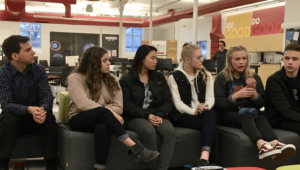Picking the right college is about to get easier
It’s only the beginning of the school year but for high school juniors the college preparation and selection clock is ticking. For those planning to attend college, the last two years of high school are a busy timeline with a series of complicated milestones: tests, essay, online searches, scholarship applications, financial aid forms, trips, and resume cramming with internships and community service. Affluent families can afford a guide through the maze, the rest get little help. With loads often exceeding 400 students and the daily crises of high school life, high school counselors can only spend a few minutes with each student talking about college and career choices.
Nearly half of low income and minority students drop out of high school. Those that make it through high school often shoot too low in their post secondary choices, end up in a community college, drop out and never finish a degree.
Picking the right college is a complex quadratic equation. Key variables include the type of school, location, career and interest areas, and cost. The internet has made online searching much easier but in some respects complicates the process with a world of choices. Two organizations are trying to solve this problem.
StriveForCollege.org was launched by Michael Carter when he was a college freshman. Frustrated by the difficulty of the process, Michael recognized that most young people weren’t as well supported as he had been and he set out to change that. With a few friends they created a partnership with a St Louis high school and found out the problem was worse than they thought for urban kids. They launched two more chapters in their second year. Now that Michael is a senior at Washington University, Strive has 10 chapters nationally and a well developed curriculum for helping urban kids make the best possible post secondary choice.
As Michael puts it, “there are 400,000 low-income students across the country who aren’t attending college at all, and the hundred of thousands more who don’t attend the colleges which offer them the greatest chances of success.” Strive can cost effectively reach many of the low income and minority students that routinely make a suboptimal college choice and can help double the number that complete a college degree.
Envictus.com is another group working on this problem. They built Navigation 101, an online aid for counselors and students to ease and inform the complicated college selection process. It has been adopted statewide in several states with the help of a corporate sponsor.
Former Princeton President Bill Bowen understands this problem better than anyone and recently released a book, Crossing the Finish Line., which explores the causes of low college graduation rates of low income and minority students and particularly the under matching problem.
Making the preparation and college section process easier and solving the under match problem will take a high tech/high touch solution—mentoring and a smart decision support platform. With Strive and Envictus working the problem, it’s about to get easier to choose the right college.






Carol Rasco
Thank you for bringing these two programs to my attention. I share with you CDI at http://www.collegiatedirections.org/, would love to introduce you to Nina Marks the founder some time. The program is doing some amazing work with first generation college goers in Montgomery County. Thanks again for the post and congrats to these outstanding "founders" of the two groups you outline.
Joan E. Deery
You made no mention of the Early College High School initiative. Why not? Thank you.